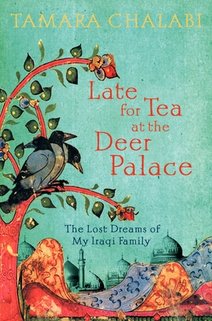
21 Jan 2011 01:31:19
The author's father, Ahmad Chalabi, is the character readers may be most curious to learn about; a key leader in the opposition to Saddam Hussein, he provided the U.S. with intelligence on weapons of mass destruction leading up to the costly invasion of Iraq that proved to be faulty.
But the controversial Iraqi politician is not the protagonist of this tale. This is Tamara Chalabi's story; one of an inheritance of exile and a struggle to connect with a distant, troubled homeland.
"He has his own tale to tell, although I acknowledge that my father has played a pivotal role in shaping my relationship with his country, Iraq," Chalabi writes. "As with everything in the Middle East, nothing makes sense until you understand the past, and the past is never straightforward."
Chalabi, who earned her doctorate in history from Harvard, brings life to the history of a country whose story has been dominated by headlines of war and death.
She tells of Abdul Hussein, the family patriarch and a prominent member of the Shia Muslim community; his son, Abdul Hadi, a businessman turned politician; and a host of other relatives who each reflect a piece of Iraqi society and culture in its founding, golden age and later turmoil.
The most compelling tale is that of Bibi Bassam, the author's grandmother. At 16, she becomes the wife of Abdul Hadi through an arranged marriage. Strong willed and good humored, she becomes an integral part of the Chalabi household and eventually the mother of nine children, the last of which is Ahmad.
Traditional yet unreserved, Bibi holds weekly gatherings for women at the beautiful Deer Palace and, in her own way, pushes for women's rights and liberation. When the family is forced into exile, Bibi, through her stories and songs, becomes a key link to the past for future generations.
But the controversial Iraqi politician is not the protagonist of this tale. This is Tamara Chalabi's story; one of an inheritance of exile and a struggle to connect with a distant, troubled homeland.
"He has his own tale to tell, although I acknowledge that my father has played a pivotal role in shaping my relationship with his country, Iraq," Chalabi writes. "As with everything in the Middle East, nothing makes sense until you understand the past, and the past is never straightforward."
Chalabi, who earned her doctorate in history from Harvard, brings life to the history of a country whose story has been dominated by headlines of war and death.
She tells of Abdul Hussein, the family patriarch and a prominent member of the Shia Muslim community; his son, Abdul Hadi, a businessman turned politician; and a host of other relatives who each reflect a piece of Iraqi society and culture in its founding, golden age and later turmoil.
The most compelling tale is that of Bibi Bassam, the author's grandmother. At 16, she becomes the wife of Abdul Hadi through an arranged marriage. Strong willed and good humored, she becomes an integral part of the Chalabi household and eventually the mother of nine children, the last of which is Ahmad.
Traditional yet unreserved, Bibi holds weekly gatherings for women at the beautiful Deer Palace and, in her own way, pushes for women's rights and liberation. When the family is forced into exile, Bibi, through her stories and songs, becomes a key link to the past for future generations.

